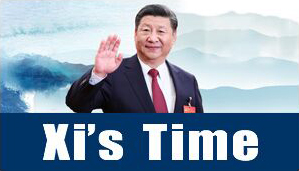BEIJING, Jan. 19 (Xinhua) -- It has been 73 years since Taiwan and the Chinese mainland were separated in 1949, due to the civil war in China and the interference of foreign forces.
As the evolution of cross-Strait relations attests, the country must be reunified, and will surely be reunified.
Since the 18th CPC National Congress in 2012, Xi Jinping, general secretary of the Communist Party of China (CPC) Central Committee, has put forward a series of important ideas and major policy propositions on Taiwan-related work, thus developing the Party's overall policy for resolving the Taiwan question in the new era.
Xinhua has compiled a list of keywords that shed light on the essence of the policy.
NATIONAL REUNIFICATION & REJUVENATION
Wang Yingjin, director of the cross-Strait relations research center of the Renmin University of China, said that pursuing the complete reunification and rejuvenation of China is undoubtedly at the core of the Party's overall policy for resolving the Taiwan question in the new era.
"The Taiwan question arose out of the weakness and chaos of our nation, and it will be resolved as national rejuvenation becomes a reality," Xi once said.
Xi's remarks struck a deep chord with Zhuang Chuanhong, 91, whose family moved to Shanghai from Taiwan in 1938 as his father was unable to tolerate Japan's colonial rule. It was not until the early 1990s that Zhuang was able to revisit his hometown of Tainan in southern Taiwan because of decades of isolation on both sides.
"Many of my relatives in my hometown are looking forward to the realization of a real reunion of both sides of the Strait at an early date," Zhuang said.
TERMINATING POLITICAL CONFRONTATION FOR LASTING PEACE
"The longstanding political differences between the two sides are the root cause affecting the steady growth of cross-Strait relations, but we should not allow this problem to be passed down from one generation to the next," Xi said in 2019.
Xi reiterated a willingness to engage in broad exchanges of views with all parties, groups, or individuals in Taiwan regarding political issues between the two sides, and the promotion of China's peaceful reunification, in order to forge social consensus and advance political negotiations.
From the perspective of Liu Guoshen, head of the Collaborative Innovation Center for Peaceful Development of Cross-Strait Relations, peaceful reunification and "one country, two systems" is the best approach to realizing national reunification.
He said that the approach maximizes the immediate interests of the people in Taiwan with due regard to the political demands of the Taiwan authorities, and embodies the long-term interests of the Chinese nation and the overall interests of the country.
Provided that China's sovereignty, security, and development interests are ensured, after peaceful reunification, Taiwan's social system and its way of life will be fully respected, and the private property, religious beliefs, and lawful rights and interests of compatriots in Taiwan will be fully protected.
PLACING HOPE ON TAIWAN PEOPLE, OPPOSING "TAIWAN INDEPENDENCE"
Secession aimed at "Taiwan independence" is the greatest obstacle to national reunification and a grave danger to national rejuvenation. The CPC remains committed to the principle of placing hope on the people of Taiwan.
The mainland has been consistently upholding the principled position of the 1992 Consensus, promoting people-to-people exchanges, delivering benefits to Taiwan people and placing hope on them, said Wang Kun-Yih, a professor at Tamkang University, adding that this is in the spirit of abiding by goodwill and sincerity.
In contrast, Taiwan's Democratic Progressive Party authority has been seeking "Taiwan independence" since it took power in 2016, instigating confrontation and using foreign forces to resist reunification, posing a serious threat to peace and stability across the Taiwan Strait.
Zhu Songling, a Taiwan studies professor at Beijing Union University, said that opposing "Taiwan independence" is integral to the overall policy of the CPC to resolve the Taiwan question in the new era. "National reunification and the downfall of 'Taiwan independence' are irreversible trends in history."
INTEGRATED DEVELOPMENT IN SHARED MARKET
"It is the best of times for Taiwan entrepreneurs to accomplish something on the mainland, as cross-Strait trade, which has grown from nothing, now is booming under the mainland's preferential policies benefiting people in Taiwan," said Wu Chia-ying, director of the Taiwan chamber of commerce in the coastal Xiamen City, who has spent the past three decades doing business on the mainland.
The mainland continues to share development opportunities with Taiwan compatriots and enterprises, ensure that they receive the same treatment as those from the mainland, and expand cross-Strait economic and trade cooperation.
Integrated development on both sides of the Strait has been promoted.
The national plan for social and economic development in the 2021-2025 period outlines efforts to strengthen cross-Strait industrial cooperation and build a common cross-Strait market to grow a stronger Chinese economy, and to encourage Taiwan entrepreneurs and enterprises to take part in the Belt and Road Initiative and the country's coordinated regional development strategy.
"With more detailed measures and policies -- from enabling Taiwan compatriots to enjoy the same healthcare and housing purchasing treatment as mainlanders, to supporting Taiwan companies in participating in new infrastructure construction and seeking listings on the mainland -- we are feeling more and more at home," Wu said.
CLOSER BONDS WITHIN THE SAME CULTURE
The closeness between people across the Strait is rooted in blood, history and culture, Xi has said on several occasions.
Chiang Ming-shyan, a renowned Taiwan artist who held a solo exhibition on the mainland in 1988, has printed one of the paintings he co-created with artists from the mainland on his name card. Chiang was among the first to bring his works to the mainland since the restoration of cross-Strait contact in 1987.
"To me, the co-created painting serves as the best footnote to the fact that people across the Strait share the same culture and blood," he said.
Past years have witnessed cultural and people-to-people exchanges between the mainland and Taiwan on a variety of topics, including Chinese characters and cultural heritage preservation.
Just as Xi once said, "Between loved ones, there is no knot of perception that cannot be untied. With perseverance, we are sure to forge closer bonds of the heart and mind between the people on both sides." ■




